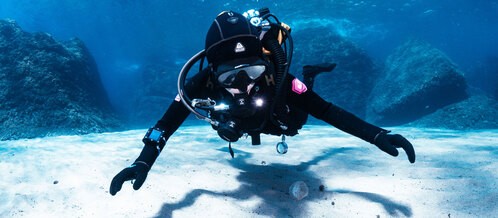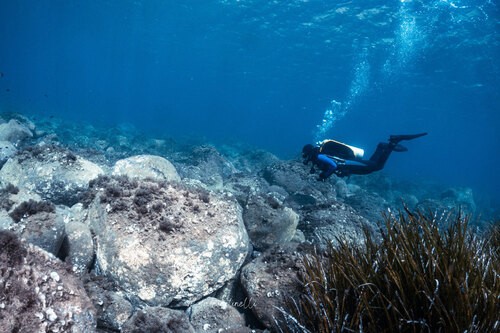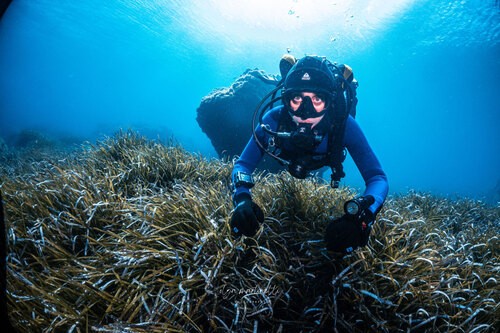Which ear drops?

Photo by: Olga Martinelli
Text By Claudio Di Manao
Divers have a special relationship with their ears. They care for them almost as much as they do for their equipment. Any mistreatment of this part of the body does not happen intentionally, but is generally the result of mistakes or oversights.
Legendary edible ingredients.
Vinegar, it is worth remembering, is one of the most revered ingredients by sailors and divers. It removes encrustations, neutralises jellyfish nematocysts, and, although the mechanism of action is unknown, is thought to strengthen the immune system and keep high blood pressure at bay. Another well-known ingredient, at least in the Mediterranean region, is olive oil. It counteracts cholesterol, and the ancient Greeks used it in place of soap or as a beauty treatment.
Much more recently, due to its emollient and waterproofing properties, olive oil has been used to soothe sunburn. For a long time, these two ingredients for delicious salad dressings were considered a panacea for ear problems. However, both vinegar and olive oil may contain allergens, of natural origin and from preservatives, that can trigger irritations. Pharmaceutical products, which are more effective, refined, well-dosed and safe, are preferable to kitchen ingredients.
Divers have a special relationship with their ears. They care for them almost as much as they do for their equipment. Any mistreatment of this part of the body does not happen intentionally, but is generally the result of mistakes or oversights.
Legendary edible ingredients.
Vinegar, it is worth remembering, is one of the most revered ingredients by sailors and divers. It removes encrustations, neutralises jellyfish nematocysts, and, although the mechanism of action is unknown, is thought to strengthen the immune system and keep high blood pressure at bay. Another well-known ingredient, at least in the Mediterranean region, is olive oil. It counteracts cholesterol, and the ancient Greeks used it in place of soap or as a beauty treatment.
Much more recently, due to its emollient and waterproofing properties, olive oil has been used to soothe sunburn. For a long time, these two ingredients for delicious salad dressings were considered a panacea for ear problems. However, both vinegar and olive oil may contain allergens, of natural origin and from preservatives, that can trigger irritations. Pharmaceutical products, which are more effective, refined, well-dosed and safe, are preferable to kitchen ingredients.

Ear maintenance.
Considering the ear as part of the equipment is not a mistake: the ear is exposed to stressors from both waterborne microorganisms and pressure variations. Many divers care for their ears the same way they care for their BCDs and regulators: they rinse them after diving. Some well-informed divers also treat their ears with a homemade solution before and after each dive as a prophylactic.
With the exception of swimming pools, all bodies of water are home to large quantities of microorganisms, ranging from plankton to bacteria, which may cause ear canal infection. The ingredients for the optimal countermeasure have been known approximately since the early days of scuba diving, and they are all readily available: water, alcohol, and vinegar. Or rather: glacial acetic acid, or pure acetic acid. As so often, getting the mix right is crucial. DAN recommends 5% glacial acetic acid, 10% water and 85% alcohol. The acid component creates an inhospitable environment for bacteria, while the alcohol helps water escape from the cells.
More drops.
Earwax plugs, as some divers have unfortunately experienced, can inhibit equalisation, with potentially serious consequences for the tympanic membrane and therefore the hearing. Earwax plugs should be softened with glycerine drops. But beware: a sense of muffled hearing and fullness in the ear is not necessarily a symptom of earwax accumulation. It can also be the consequence of a tubal problem, i.e., of a problem in the middle ear. After a dive in which you have experienced difficulties with equalisation, you should consider that the problem might be caused by a swelling of the tubes due to inflammation, or that some secretion might have adhered to the tympanic membrane from the inside.
This is only one of many cases in which it would be better to consult a specialist before taking any action. Other cases include outer ear infection: Is it bacterial, viral, or fungal? About ninety percent of external ear infections are of bacterial origin, ten percent are fungal, and viral infections are rare. Each needs a different remedy. The most important question is whether there is any damage to the tympanic membrane. In the event of a perforation, even a tiny one, drops can worsen the situation. ‘Organic’ or ‘natural’ remedies sold in herbalist shops and, alas, even in some pharmacies, can cause allergies.
Considering the ear as part of the equipment is not a mistake: the ear is exposed to stressors from both waterborne microorganisms and pressure variations. Many divers care for their ears the same way they care for their BCDs and regulators: they rinse them after diving. Some well-informed divers also treat their ears with a homemade solution before and after each dive as a prophylactic.
With the exception of swimming pools, all bodies of water are home to large quantities of microorganisms, ranging from plankton to bacteria, which may cause ear canal infection. The ingredients for the optimal countermeasure have been known approximately since the early days of scuba diving, and they are all readily available: water, alcohol, and vinegar. Or rather: glacial acetic acid, or pure acetic acid. As so often, getting the mix right is crucial. DAN recommends 5% glacial acetic acid, 10% water and 85% alcohol. The acid component creates an inhospitable environment for bacteria, while the alcohol helps water escape from the cells.
More drops.
Earwax plugs, as some divers have unfortunately experienced, can inhibit equalisation, with potentially serious consequences for the tympanic membrane and therefore the hearing. Earwax plugs should be softened with glycerine drops. But beware: a sense of muffled hearing and fullness in the ear is not necessarily a symptom of earwax accumulation. It can also be the consequence of a tubal problem, i.e., of a problem in the middle ear. After a dive in which you have experienced difficulties with equalisation, you should consider that the problem might be caused by a swelling of the tubes due to inflammation, or that some secretion might have adhered to the tympanic membrane from the inside.
This is only one of many cases in which it would be better to consult a specialist before taking any action. Other cases include outer ear infection: Is it bacterial, viral, or fungal? About ninety percent of external ear infections are of bacterial origin, ten percent are fungal, and viral infections are rare. Each needs a different remedy. The most important question is whether there is any damage to the tympanic membrane. In the event of a perforation, even a tiny one, drops can worsen the situation. ‘Organic’ or ‘natural’ remedies sold in herbalist shops and, alas, even in some pharmacies, can cause allergies.

Experts agrees on this.
Drops of the ‘Galenic’ vinegar-water-alcohol preparation, dispersed into the ear canal before and after diving, have proven to be very useful and can be used without any problem. Anti-itch drops can also be used in the absence of other symptoms. In the event of itching, or worse, intense discomfort or pain, it would be best not to introduce any do-it-yourself preparations before consulting a specialist.
Bottom line: Prevention is the diver’s job, treatment the specialist’s.
Drops of the ‘Galenic’ vinegar-water-alcohol preparation, dispersed into the ear canal before and after diving, have proven to be very useful and can be used without any problem. Anti-itch drops can also be used in the absence of other symptoms. In the event of itching, or worse, intense discomfort or pain, it would be best not to introduce any do-it-yourself preparations before consulting a specialist.
Bottom line: Prevention is the diver’s job, treatment the specialist’s.
Categories
2025
2024
February
March
April
May
October
My name is Rosanne… DAN was there for me?My name is Pam… DAN was there for me?My name is Nadia… DAN was there for me?My name is Morgan… DAN was there for me?My name is Mark… DAN was there for me?My name is Julika… DAN was there for me?My name is James Lewis… DAN was there for me?My name is Jack… DAN was there for me?My name is Mrs. Du Toit… DAN was there for me?My name is Sean… DAN was there for me?My name is Clayton… DAN was there for me?My name is Claire… DAN was there for me?My name is Lauren… DAN was there for me?My name is Amos… DAN was there for me?My name is Kelly… DAN was there for me?Get to Know DAN Instructor: Mauro JijeGet to know DAN Instructor: Sinda da GraçaGet to know DAN Instructor: JP BarnardGet to know DAN instructor: Gregory DriesselGet to know DAN instructor Trainer: Christo van JaarsveldGet to Know DAN Instructor: Beto Vambiane
November
Get to know DAN Instructor: Dylan BowlesGet to know DAN instructor: Ryan CapazorioGet to know DAN Instructor: Tyrone LubbeGet to know DAN Instructor: Caitlyn MonahanScience Saves SharksSafety AngelsDiving Anilao with Adam SokolskiUnderstanding Dive Equipment RegulationsDiving With A PFOUnderwater NavigationFinding My PassionDiving Deep with DSLRDebunking Freediving MythsImmersion Pulmonary OedemaSwimmer's EarMEMBER PROFILE: RAY DALIOAdventure Auntie: Yvette OosthuizenClean Our OceansWhat to Look for in a Dive Boat
2023
January
March
Terrific Freedive ModeKaboom!....The Big Oxygen Safety IssueScuba Nudi ClothingThe Benefits of Being BaldDive into Freedive InstructionCape Marine Research and Diver DevelopmentThe Inhaca Ocean Alliance.“LIGHTS, Film, Action!”Demo DiversSpecial Forces DiverWhat Dive Computers Don\'t Know | PART 2Toughing It Out Is Dangerous
April
